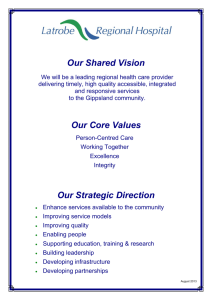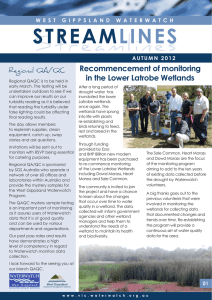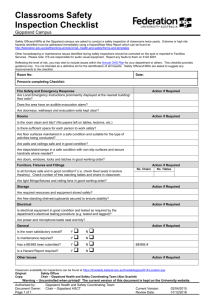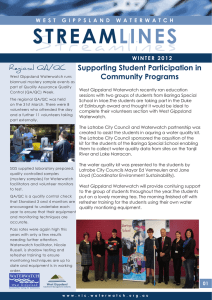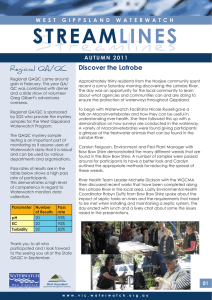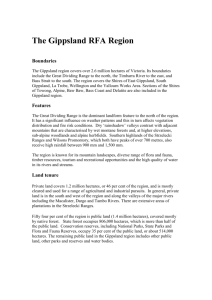Stream Lines Inside this issue: PADDLING THE POWLETT Gippsland Waterwatch Newsletter
advertisement
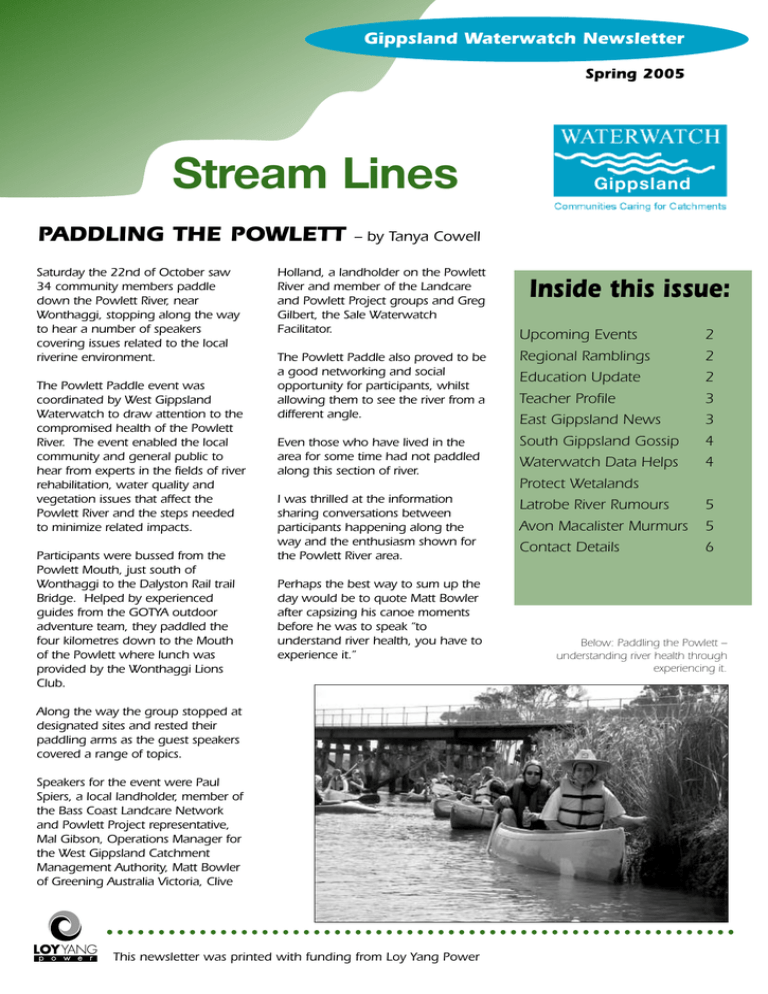
Gippsland Waterwatch Newsletter Spring 2005 Stream Lines PADDLING THE POWLETT Saturday the 22nd of October saw 34 community members paddle down the Powlett River, near Wonthaggi, stopping along the way to hear a number of speakers covering issues related to the local riverine environment. The Powlett Paddle event was coordinated by West Gippsland Waterwatch to draw attention to the compromised health of the Powlett River. The event enabled the local community and general public to hear from experts in the fields of river rehabilitation, water quality and vegetation issues that affect the Powlett River and the steps needed to minimize related impacts. Participants were bussed from the Powlett Mouth, just south of Wonthaggi to the Dalyston Rail trail Bridge. Helped by experienced guides from the GOTYA outdoor adventure team, they paddled the four kilometres down to the Mouth of the Powlett where lunch was provided by the Wonthaggi Lions Club. Gippsland – by Tanya Cowell Holland, a landholder on the Powlett River and member of the Landcare and Powlett Project groups and Greg Gilbert, the Sale Waterwatch Facilitator. The Powlett Paddle also proved to be a good networking and social opportunity for participants, whilst allowing them to see the river from a different angle. Even those who have lived in the area for some time had not paddled along this section of river. I was thrilled at the information sharing conversations between participants happening along the way and the enthusiasm shown for the Powlett River area. Perhaps the best way to sum up the day would be to quote Matt Bowler after capsizing his canoe moments before he was to speak “to understand river health, you have to experience it.” Along the way the group stopped at designated sites and rested their paddling arms as the guest speakers covered a range of topics. Speakers for the event were Paul Spiers, a local landholder, member of the Bass Coast Landcare Network and Powlett Project representative, Mal Gibson, Operations Manager for the West Gippsland Catchment Management Authority, Matt Bowler of Greening Australia Victoria, Clive This newsletter was printed with funding from Loy Yang Power Inside this issue: Upcoming Events Regional Ramblings Education Update Teacher Profile East Gippsland News South Gippsland Gossip Waterwatch Data Helps Protect Wetalands Latrobe River Rumours Avon Macalister Murmurs Contact Details 2 2 2 3 3 4 4 5 5 6 Below: Paddling the Powlett – understanding river health through experiencing it. Calendar of Events Catch a Carp Day - Lake Narracan December 4th – Contact Nadine Cranenburgh Summer by the Sea Macro Activity - Eagle Point January 5th – Contact Bec Van Der Heyden Summer by the Sea Macro Activity - Raymond Island January 4th – Contact Bec Van Der Heyden Summer by the Sea Macro Activity - Lakes Entrance January 5th – Contact Bec Van Der Heyden Summer by the Sea Macro Activity - Lake Tyers January 10th – Contact Bec Van Der Heyden Summer by the Sea Macro Activity - Mallacoota January 11th – Contact Bec Van Der Heyden Summer by the Sea Macro Activity - Cape Conran January 12th – Contact Bec Van Der Heyden Summer by the Sea Macro Activity - Marlo January 13th – Contact Bec Van Der Heyden West Gippsland Waterwatch QA/QC Day - January 25th - facilitators will contact you with details REGIONAL RAMBLINGS by Nadine Cranenburgh & Becky Van Der Hayden In the west…. It has been a very busy three months for West Gippsland Waterwatch… We have run two canoe tours (Powlett and Thomson River), and are now gearing up for our Catch a Carp Day at Lake Narracan, we hope you can all make it there. Over Christmas we will be taking a well earned break to recoup, and prepare for next year – between the 12th of December and the 3rd of January. If you drop us an email in this time we will get back to you as soon as we return. You may have noticed that the sponsor profile is missing from this edition of the newsletter. All of our sponsors have been profiled, so we will now feature a case study from one of our sponsors in each newsletter… See Latrobe River Rumours for this edition’s article. All the best for the holiday season – see you in the new year! In the east… Megan Burns and Josh Puglisi have both sadly left, Megan has moved on to becoming the Communications Officer for the ECMA and Josh has departed to spend time with his beautiful baby girl Eleanora and wife Carla. Megan still works from the EGCMA office in Bairnsdale so please feel free to give her a call and have a chat. Josh and his family are still at the Coastal Park in Cape Conran, and they would be more than happy if you dropped in. They have both been extremely valuable resources to Waterwatch in East Gippsland, through the years Waterwatch has developed into a strong environmental education tool for the community. Thankyou for your hard work guys – you will be greatly missed. RIGHT: Farewell to Megan Burns and Josh Puglisi Page 2 Stream Lines Winter 2005 Education Update by Marni Speed Du rin g Octo ber Wes t G ipps land W aterw atch del ive red a pro fes sio nal dev elo pme nt day o n water quali ty f or tea cher s inv olv ed in a pro jec t ent i tl ed E nvi ro nme nt al Scie nce t o En vi ro n m e n t a l J ou rn a l i s m . The Latrobe region cluster of schools received funding from the Australian Government under the ASISTM (Australian School Innovation in Science, Technology and Mathematics) Project and will be undertaking a water quality monitoring program as part of their activities. The ASISTM Project aims to bring about valid and lasting improvements to the ways in which science, technology and mathematics are taught in schools. Links to industry, the science community and educational institutions are a vital part of the plan to encourage innovation. Monash University and the Amphibian Research Centre in Werribee are partners in the Environmental Science to Environmental Journalism project along with West Gippsland Waterwatch. The schools involved are Churchill, Churchill North, Yinnar, Crinigan Road, Morwell Park and Commercial Road Primary Schools. On the day participants received their new Waterwatch monitoring kits and learnt about methods to test for different water quality parameters. Some teachers also decided to collect samples in the field despite the inclement weather, demonstrating their level of enthusiasm! After lunch the teachers were able to practice their new skills by teaching some borrowed students at Churchill Primary School. I am happy to report they all went very well! We are excited to be involved in the project and are looking forward to seeing the results next year, good-luck to all involved. EAST GIPPSLAND NEWS by Becky Van Der Heyden We have been extremely busy in the given out to volunteers for five and Thankyou to everyone for participating last few months; we have had the ten year service, certificates of in the activities and events organised East Gippsland Student River/ recognition and encouragement by Waterwatch and if there is any Environmental Forum and our ten awards. I would like to thank all of the activity or event you think we should year reunion of Waterwatch in East volunteers for their hard work and hold please give me a call on 5150 Gippsland. timely efforts they put in to monitoring 3577. water quality across the region, Russell Over 120 selected students from Broomhall for his entertaining master across the region attended the forum. of ceremonies, natural resource The day was well received by all in managers for supporting Waterwatch; attendance with presentations by and the past and present Waterwatch schools and natural resource Coordinators and Facilitators for managers, natural resource displays, making Waterwatch in East Gippsland ideas and discussions on what it is today! BELOW LEFT: Award recipients at the East Gippsland Waterwatch 10 year reunion. BELOW: Students at the East Gippsland Student River/ Environmental Forum enjoy lunch and the displays. environmental issues and actions, and a great big tasty lunch! Our ten year reunion was held at ‘The Colosseum’ on the 10th of October with Marathon Swimming Champion, Tammy Van Wisse giving a terrific presentation on her water experiences. There were awards Teacher Profile Name: Max Sargent School: Commercial Road Primary School Year Levels Taught: Grades 3 and 4 Involved with Waterwatch since? June 2002 Parameters monitored: Air temperature, Water temperature, pH Electrical Conductivity, Reactive Phosphorus, Turbidity Started monitoring: 20th August 2004 What do you enjoy most about Waterwatch? Getting to know our local environment from a unique perspective. What projects are you involved with? A weekly Science Club that is run after school. Our focus is the Morwell River Wetlands and the gateway to study this environment has been through frogs. And of course Waterwatch gives us our focus for water quality and macros as we investigate what is best for frogs. This club is also establishing links with Oregon schools that also study wetlands. We have developed an interactive website at www.4hcorroboree.org to share experiences. We are looking for other schools in Australia who would like to join the Corrroboree. The most significant project in the last year has been the development of a frog garden at school, involving parents, children, community businesses and Rotary. Each month we also have families involved in frog census recordings at the Morwell River Wetlands. We hope to extend this to include community volunteers who monitor other sites. Our results are posted at www.commercialps.vic.edu.au Page 3 Stream Lines Winter 2005 The Amphibian Research Centre in Werribee gives support and training for our activities. The grade 5-6's at Commercial Road Primary will focus on surveying for the Growling Grass Frog. If any Waterwatch volunteers know of any habitat where they have sighted this frog we would be very interested to know. South Gippsland Gossip by Tanya Cowell I have some sad news to break, Jo James NCI Project Officer is leaving the position, and the area later in the year. It has been a pleasure working with Jo over the last 2.5 years personally. Jo has been an asset to the NCI Project for the last 4 years and will be greatly missed. Good Luck Jo – and all the best for the future - from the West Gippsland Waterwatch Team. National Water Week schools activities were scaled back this year to accommodate for the lead up to the Powlett Paddle but two schools were visited in the week; Alberton Primary School and Fish Creek Primary School, activities centered around catchment health and wetlands. Training highlights in the last few months include NHT Cultural Heritage Training in Traralgon and Coast Action / Coast Care education and interpretation training in Inverloch. I’m studying for a Post Grad. Cert. in River Restoration and Management through Charles Sturt University at the moment and attended a very interesting residential school held in Wagga Wagga in September. See below for picture of a timber pile fields to rectify an unnatural flow split between the Murray River and its anabranch, Dights Creek. Timber pile fields rectify an unnatural flow split between Murray River and Dights Creek Waterwatch data helps protect wetlands by Michelle Dixon West Gippsland boasts a rich diversity of wetlands, from alpine bogs and floodplain billabongs to coastal lagoons and estuaries. With links to the West Gippsland River Health Strategy, the plan will provide a strategic framework for the protection, enhancement and rehabilitation of wetlands in the region. Wetlands are an important component of catchment health, providing a range of important ecological and recreational services that we are often not aware of. Wetlands provide specialised habitat for a great diversity of flora and fauna and help trap and filter sediments and nutrients from incoming water flow, an action that contributes to the quality of water remaining in and leaving the wetland. Waterwatch is playing an important role in the development of the Regional Wetlands Plan, through the provision of wetland data including: water quality; water birds and vegetation. Unfortunately many wetlands have been altered as a result of land clearing and drainage practices in the surrounding catchment. One of the biggest obstacles to protecting and restoring wetlands is the limited information that is available regarding individual and specific wetlands within the region. As the caretaker of river health in the region, the West Gippsland Catchment Management Authority (WGCMA) is currently developing a Regional Wetlands Plan funded by the State Government’s Our Water Our Future initiative. RIGHT: Catchment week tour at Dowd’s Morass Page 4 Stream Lines Winter 2005 This information will build a picture of the health of wetlands in the region and will assist in the development of actions and priorities to guide the region’s management of wetlands. The response by Waterwatch volunteers to the recent community wetland survey will also help the WGCMA identify how people use wetlands and what they value about them. Latrobe River Rumours by Rebecca McGuigan (Gippsland Water) Tammy Dawson will be on annual leave between 11th November and 3rd January – exploring Thailand, Nepal and Laos… we will catch up with Tammy in January to hear about all her adventures! A Win at Waterhole Creek… Following almost five days of investigations the source of this problem was identified. Gippsland Water discovered a stormwater pipe cutting through a sewer pipe around which a pit had been constructed. There was a hole in the top of the stormwater pipe, cracks in the side of the sewer pit and evidence that the level of sewerage effluent in the pit had recently reached a high level. Waterhole Creek is a small waterway flowing through Morwell. Gippsland Water has been working with Waterwatch to investigate the cause of complaints from the community and Waterwatch volunteers, regarding reported overflows from sewer pipes into the creek. It is believed that sewer overflow incidents occurred when the sewerage effluent in the sewer pit rose to a level that allowed it to enter the hole in the stormwater pipe. This also allowed sewerage effluent to seep from the pit cracks to enter the stormwater pipe and then flow into Waterhole Creek. Extensive investigations and monitoring have revealed that during significant rainfall events there is a high risk of sewer overflow into Waterhole Creek. A $350,000 project has been designed and approved to resolve the problem and is planned to commence shortly. Latrobe City has responded quickly to this problem and has reconstructed the stormwater system to protect the creek from future overflows. However, ongoing monitoring by Waterwatch of Waterhole Creek revealed that there was another problem occurring during dry flow conditions (no rainfall). This prompted Gippsland Water to initiate further extensive stormwater and sewer system investigations using pit inspections and camera inspections for both the stormwater and sewer mains. Avon / Macalister Murmurs Showtime… We have just passed five years attendance at the Sale Show. During each of the two days more than 100 children, their parents and other show attendees passed our stand. Stickers, pamphlets, posters, and cards were given out promoting Waterwatch locally. Our macroinvertebrate tray continued to fascinate visitors and the ability to place these bugs under a digicam, bringing the various insects, crustacean and arachnids up on the computer screen. Gippsland Water would like to thank Waterwatch for their commitment to protecting Waterhole Creek and for their support during these investigations. LEFT: Works to protect waterhole creek from Sewer Overflows. MIDDLE: Waterwatch Volunteer Merv Geddes, Benita Russel (EPA), Rob Suares (Gippsland Water). RIGHT: Stormwater pipe running through a sewer pit. Hole can be observed in middle of the stormwater pipe. by Greg Gilbert Each day separate river sites were assessed, adding to the river sites assessed during National Water Week activities at the Heyfield Wetlands. With the late winter rains the assessments have indicated greater pressures on local upper river sites (considerable sediment load effects) while the volume of rain passing through the system at this time has meant that the lower river sites assessed seem to have benefited through sediment flushing. Stormwater… Sion Catholic College students continue to excel in their great involvement in Stormwater Tours and their follow-up site visits to enhance their science and develop other understandings. This year the new aspects of the landscape architectural works at the Sale saleyards were particularly interesting. One of the Sion classes also set about planting 100 trees on the Flooding Creek at the Powder Magazine. Sion Catholic College plants trees at Flooding Creek Page 5 Stream Lines Winter 2005 Contact Details: Na d ine Cr anen bur gh West Gippsland Regional Coordinator 16 Hotham St, Traralgon 3844 Ph: (03) 5175 7800 Email: nadinec@wgcma.vic.gov.au Greg Gilbert Sale region Facilitator 906 Dolphin Av, Golden Beach 3851 Ph: (03) 5146 3217 Email: ggil@netspace.net.au" T a n ya C o w e ll South Gippsland Facilitator P.O. Box 99, Leongatha 3953 Ph: (03) 5662 4555 Email: tanyab@wgcma.vic.gov.au M a r n i S pe e d Education and Professional Development Officer 16 Hotham St, Traralgon 3844 Ph: (03) 5175 7800 Email: marnis@wgcma.vic.gov.au T am m y D aw so n Latrobe Facilitator 16 Hotham St, Traralgon 3844 Ph: (03) 5175 7800 Email: louiseb@wgcma.vic.gov.au" B e c k y V a n De r H e y d e n East Gippsland Regional Co-ordinator PO Box 1012, Bairnsdale 3875 Ph: (03) 5150 3577 Email: bvanderheyden@egcma.com.au Key Stakeholders & Sponsors DPI/DSE Gippsland STREAM LINES – The Gippsland Waterwatch Newletter
